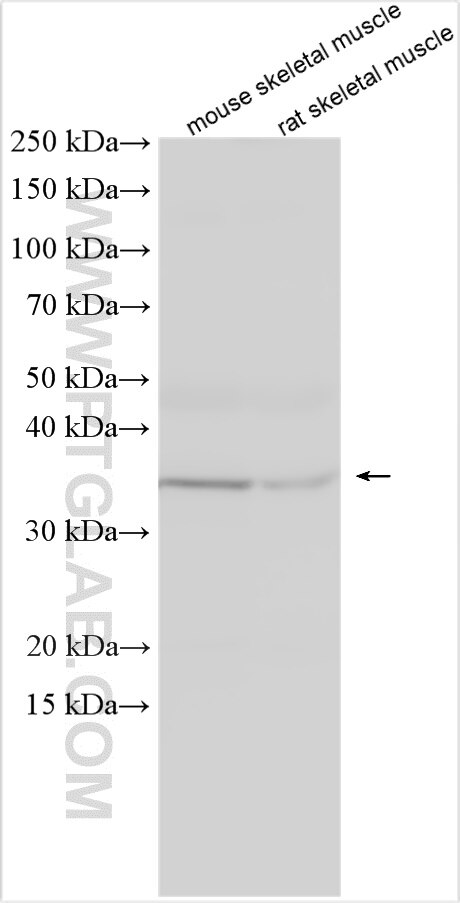ZIP13 Polyklonaler Antikörper
ZIP13 Polyklonal Antikörper für WB, ELISA
Wirt / Isotyp
Kaninchen / IgG
Getestete Reaktivität
human, Maus, Ratte
Anwendung
WB, ELISA
Konjugation
Unkonjugiert
Kat-Nr. : 26496-1-AP
Synonyme
Galerie der Validierungsdaten
Geprüfte Anwendungen
| Erfolgreiche Detektion in WB | HeLa-Zellen, Maus-Skelettmuskelgewebe, Ratten-Skelettmuskelgewebe |
Empfohlene Verdünnung
| Anwendung | Verdünnung |
|---|---|
| Western Blot (WB) | WB : 1:1000-1:4000 |
| It is recommended that this reagent should be titrated in each testing system to obtain optimal results. | |
| Sample-dependent, check data in validation data gallery | |
Produktinformation
26496-1-AP bindet in WB, ELISA ZIP13 und zeigt Reaktivität mit human, Maus, Ratten
| Getestete Reaktivität | human, Maus, Ratte |
| Wirt / Isotyp | Kaninchen / IgG |
| Klonalität | Polyklonal |
| Typ | Antikörper |
| Immunogen | ZIP13 fusion protein Ag24388 |
| Vollständiger Name | solute carrier family 39 (zinc transporter), member 13 |
| Berechnetes Molekulargewicht | 371 aa, 39 kDa |
| Beobachtetes Molekulargewicht | 32 kDa |
| GenBank-Zugangsnummer | BC008853 |
| Gene symbol | SLC39A13 |
| Gene ID (NCBI) | 91252 |
| Konjugation | Unkonjugiert |
| Form | Liquid |
| Reinigungsmethode | Antigen-Affinitätsreinigung |
| Lagerungspuffer | PBS mit 0.02% Natriumazid und 50% Glycerin pH 7.3. |
| Lagerungsbedingungen | Bei -20°C lagern. Nach dem Versand ein Jahr lang stabil Aliquotieren ist bei -20oC Lagerung nicht notwendig. 20ul Größen enthalten 0,1% BSA. |
Hintergrundinformationen
ZIP13, a member of the SLC39A/ZIP family, is mainly localized in the Golgi apparatus. It has been shown to play important roles in the development of bone, tooth and connective tissues. The apparent molecular weight of ZIP13 detected by SDS/PAGE was lower than its expected molecular mass (32 kDa), likely because of the largely hydrophobic nature of the protein, its high capacity to bind SDS, and, therefore, its more rapid migration during gel electrophoresis (PMID: 23213233).
Protokolle
| Produktspezifische Protokolle | |
|---|---|
| WB protocol for ZIP13 antibody 26496-1-AP | Protokoll herunterladen |
| Standard-Protokolle | |
|---|---|
| Klicken Sie hier, um unsere Standardprotokolle anzuzeigen |



